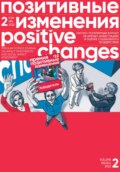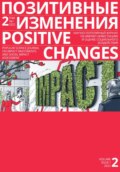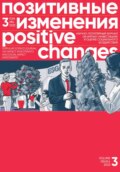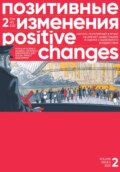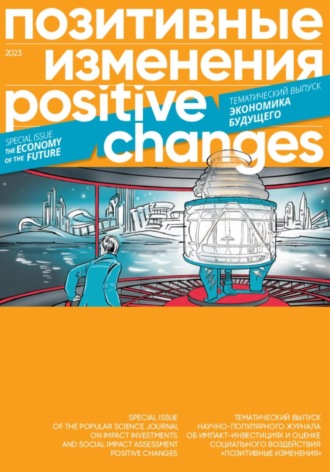
Редакция журнала «Позитивные изменения»
Позитивные изменения. Тематический выпуск «Экономика будущего» (2023). Positive changes. Special issue «The economy of the future» (2023)
“Economic Education Must Be for the Good of the People and the Planet.” Interview with Sonal Raghuvanshi, Economists for Future
Natalia Gladkikh
DOI 10.55140/2782–5817–2023–3-S1–32–38

In August 2018, a series of climate strikes were organized across schools under the banner of Fridays for Future. Later, this sense of urgency was supported by the academic and scientific communities at large, which called upon governments around the world to reduce global carbon emissions (the Scientists for Future movement). Within the economics discipline, a network of students and scholars from several countries joined forces-advocating for change and aiming to mobilize economists and the influence they have, to help arrest the planetary emergency and giving rise to Economists for Future, a movement that believes the economics community must become a driving force toward a just and equitable post-carbon world.

Sonal Raghuvanshi

Natalia Gladkikh
Editor-in-chief, Positive Changes Journal
Sonal Raghuvanshi is one of the brightest representatives of the E4F movement. She leads Research and Strategy at the Economists for Future International, is a critical appraiser of economics discipline, and an advocate for curriculum change at the Rethinking Economics Network. Sonal also works at the Indian Institute of Technology Bombay, where she is involved in the creation of the New Political Economy Initiative. Her research has centered around the role of finance in development, macroeconomic policy in developing countries, structural explanations of global inequality, and political economy of development and climate change.
We talked to Sonal about what change is needed in today’s version of economics education, how students’ actions facilitate the development of climate education syllabi, and whether it is possible to learn economics from non-traditional academic sources.
You are one of the brightest representatives of the student movement to change economic education in the world. Please tell us more about Economists for Future and what its main activities are.
How does it relate to the Rethinking Economics movement?
Economists for Future (E4F) is an international initiative, Its main goal is to mobilize economists and use their influence to help arrest a planetary emergency. With a vision that the economics community becoming a powerful force in accelerating the urgent transformation to an equitable post-carbon world. Developments of the past few decades have shown quite clearly that while there some broad consensus that climate change is real, globally, we need to move quickly to be able to deal with the problem; there has also been a serious lack of action from those who are capable of taking action.
When it comes to economics as an academic discipline, it’s the same for economists as it is for everyone else: top economics journals were paying little attention to the climate crisis, nor did the existing literature have any distribution and equity concerns embedded. Economists were rarely speaking out about the issue in public, and departments were not covering these questions in compulsory courses. The economics profession was (and in many ways is) failing to fulfill its social role: a discipline that dedicates itself to studying the economy simply cannot afford to avoid engaging in the economic transformation that climate science requires.
E4F International emerged out of Rethinking Economics’ international network in solidarity with the Fridays for Future and Scientists for Future movements to further the demands for urgent action within the economics discipline in order to rupture some of the discipline-wide inertia. The core team behind E4F International is small and closely linked to the student and academic movement across the world. Our main activities include making a credible case for change through targeted research and analysis, in addition to running various advocacy campaigns focused on the international power structures within the discipline. A large part of our work includes tracking the changes happening at the knowledge production end of the discipline and supporting university students to make a case for curriculum change and to help pedagogues, instructors and popular educators to create courses and lesson plans to address such demands. We also have a vibrant German community which run a German-language platform that generates critical and constructive impulses for the development of a future fit economy and economic science.
The education, knowledge production and praxis of contemporary economics lacks diversity – of methods, theories, epistemology and methodology.
What are the key problems in economics education today?
I have to say right from the start that the problems with economics education are very much symptomatic of the state of the economics discipline as one of the most monolithic fields within the social sciences. For over a decade, dissatisfaction within the ranks of economics has been met with an incrementalist approach, whereas now we are at a juncture where there is a need for serious and well-thought intervention in the way we are taught economics and this has to be cogently linked to its praxis. To put it briefly, the education, knowledge production and praxis of contemporary economics lacks diversity – diversity of methods, theories, epistemology, and methodology.
If one were to elaborate on a few of these issues, the dominance of neoclassical theory is what severely limits the curriculum’s ability to address key issues of our time like the climate crisis, social and economic inequality, financial instability, unpaid work, issues of distribution, equity and ethics among other things. This ultimately leads to an incongruous oversimplification of the real-world situation, because the neoclassical understanding of the economy is itself based on individualism, optimization, and equilibrium: from being over-optimistic about how financial markets work to misplaced arguments in favor of fiscal austerity or dismissing as 'externalities' the critical relationships between humans and nature that form the basis of material production, etc.
What other problems of economic education could you highlight?
Another key issue is the idealized and overly simplistic historical narrative that is pervasive in the curriculum. For example, the current syllabi stay ignorant of the role of oppression, violence, power and embedded structural inequalities in historical economic development. This in turn categorically restricts the student’s ability to contemplate how the modern economies should be restructured. The same is true about the story of globalization, gender and reproductive control as being central to economic organization, or the role of colonialism, caste-based structures, or land appropriation as the foundation of modern economies.
The third issue is the existence of the structural barriers to access faced within the profession with respect to gender, ethnicity, caste, class, and geographic location. The fourth, and probably the most concerning for E4F, is that economics education, rooted in neoclassical economics (including resource and environmental economics), is incapable of confronting the climate crisis and for that matter, the root causes of the intertwined social and ecological crises the world is facing today. This is particularly due to the lack of a biophysical foundation and systems mindset during the teaching and implementation of economic policies that leaves students completely incapable of getting to the roots of the problems and finding transformational solutions to address them. This also relates to the lack of interdisciplinarity in economics education and critical pluralism, of the theoretical and methodological kind.
Economists for Future is a global movement. Are there any differences between countries in respect of what economics students are taught and the way they are taught? What is the basis of these differences?
Of course, there are differences and the fundamental ones are a result of the history of those societies and the influences of dominant trends that have contributed to both the content development and pedagogical tools embraced by various departments. Other factors, such as heterogeneity of the general requirements posed by country-specific higher education regulators, requirements imposed by various universities/departments/centers, nomenclature of the degree, evaluation methodology structure, content of the degree (syllabus) program, to name a few, add up to these differences. We also see differences among universities within a country and that is what makes the task or even the landscaping efforts both challenging and profound.
Who has made greater progress than the others and is now pioneering the innovation?
In terms of progress, there cannot be any obvious 'pioneers' by definition, because demands for curriculum change are fundamentally gearing towards transformational or rather paradigm shifts. And for transformational change to occur, it usually involves some kind of positive feedback process (or multiple feedback processes) that triggers further rounds of effects that are greater than the original change. But there are definitely some great campaigns that have triggered changes in this direction. For example, the recent End Fossil protest by students at the University of Barcelona resulted in the introduction of a mandatory course on the climate crisis from 2024 onwards, alongside a training program on climate issues for its 6,000 academic staff, after the establishment agreed to meet the demands of activists conducting a sit-in occupation. Not to mention the fact that some institutions across the world are taking this demand very seriously across their undergraduate, masters and PhD programs and are providing very good education to their students. But the key is that the consciousness or rather the urgency for this kind of transformation needs to be taken far and wide in a consistent manner.
What would you call the ideal economic education? What are the key differences from the way economics are taught today?
While this is far from ideal, for E4F, economics education must be geared towards people and the planet, and for that to happen, it needs to be capturing the real world, and it must be critical and democratic. Each of these criteria have been defined quite well by several of our allied organizations. The process of defining an ideal economics education has to be contextual as much as collaborative, and it requires a time of its own. To borrow from Eric Olin Wright, the endeavor is emancipatory, social and scientific[13]. But to summarize it, we are far from the ideal today, and that places significant limitations on our imagination and transformative potential.
What steps do you think are needed to start teaching economics in a way that truly creates positive social change?
I feel addressing some of the key problems that I mentioned in my responses above would be a good place to start. But it is not as simple as an educator deciding to teach differently one fine day and changing the course of economics education, because the very same structures of dominance apply in this case too, not to mention the internal capacity-building that the educators themselves have to undergo. But when we think of the steps needed to teach economics, one must also think about curriculum reform and pedagogic reform, too.
At the curriculum level, the instructors need to have a good sense of the content of their reading lists and textbook recommendations, making sure that there is a pluralism of theories, perspectives, methods and identities. The instructors also need to be cognizant of the topics and issues taught in the classroom – from making sure that marginalized issues (like informal economy in the Global South or unpaid work, etc.) to urgent societal issues (like environmental breakdown, climate crisis, gender inequities, etc.) are discussed in all their richness. While there are several nuances associated with this aspect alone, the key here is to be explicit in showing the students that there are competing and alternative ways of knowing, and how following any theory affects one’s point of view on the economy. It is not easy to find resources in the form of neatly packaged textbooks and supplementary materials. There is still quite a lot around, to name a few: Heterodox Economics Newsletter, Exploring Economics, Economy Studies, D-Econ, the I-peel.org website, REIN Pluralist Database, E4F. There are also various heterodox departments that are doing their job quite well, and can be a helpful resource for educators.
Is it possible to study economics without a textbook? When it comes to pedagogy, avoid using one textbook alone and encourage students to learn about the economy beyond books and articles, also explore blogs, videos, podcasts, tweets and debates. When it comes to assessments, it is vital that the students develop clear and coherent writing skills, but they also must be motivated to develop their verbal and social skills through group work and by giving them an opportunity to learn to better communicate complex economic concepts in a compelling and honest way to the general public. It is also important for the teachers to encourage students to engage with local social movements and groups outside the university. This is definitely not all but these are a few suggestions that a number of like-minded collectives have put forth in various forums.
Moreover, at E4F, it is our major goal that economics students are trained to study the economy through the lens of the planetary emergency from the outset. Economics departments (and to the extent possible, instructors) must design their curricula to include the biophysical dependencies of economic activity as a key component. In other words, the ecological crises in general and the climate crisis in particular should be addressed across economics courses with clear recognition of the planetary boundaries.
Applied project-based learning is often singled out as one of the most relevant approaches for today. Do you think introducing this approach to teaching economics will make a significant change?
Yes, combined with various other methods, it can be a great pedagogical tool, especially when it comes to real-world engagement and teaching students to navigate the policy challenges of a complex but fragile world. It can be an innovative tool both for training and assessment purposes. But again, it is but one of many tools. The crux of the matter lies in targeting the content (curriculum) taught in the classrooms that needs to radically shift from the dominant canon.
What do you think the economy of the future should be like?
That is a difficult question indeed. Contemporary arrangements should worry us more than anything else and I think where we are in the future depends on how quickly we change our modus-operandi as a society and undergo radical structural transformation to become more equitable and fair. It is partly a question of changes in the national political economy and partly a question of the global architecture that actively facilitates the realization of progressive goals. The future is another place a long way away. It is a place we hope to get to, definitely not a pipe-dream.
Generally speaking, what can economists do for the future?
To paraphrase E4F’s vision, in the future, the economics community should become a powerful force in accelerating the urgent transformation to an equitable post-carbon world. And to do so economists bear a social responsibility to present to society accurate and scientifically justified knowledge about how the climate crisis and ecological crises affect our economies, and produce recommendations to key stakeholders as to what can be done to prevent the harmful impacts of these changes.
To build for tomorrow, economists need to present a credible analysis of what is wrong with the way our economies are structured today. We at E4F believe that pushing for change within the economics profession is a means to an end: a means to making the economy operate within the planet’s biophysical limits.
We also recognize that the discipline will not change on its own, without sustained and fierce campaigning, so, as economists, it is our job to get organized and try to disrupt the status quo in the discipline – imbibing the urgency shown by the activists and civil society organizations, as well as the ethos of trade unions, i.e. that 'the power to win is in the community'[14].
Экспертные статьи / Expert Publications
(Не)равенство в прошлом и будущем. Взгляд авторов «самых влиятельных книг по экономической истории нового тысячелетия»
Иван Смекалин
DOI 10.55140/2782–5817–2023–3-S1–39–48

Парижская школа экономики и Высшая школа социальных наук Парижа организовали в мае 2023 года круглый стол с обсуждением книг «Великое расхождение» Кеннета Померанца и «Капитал в XXI веке» Томы Пикетти. По мнению организаторов дискуссии, это две наиболее влиятельные книги по экономической истории нового тысячелетия, которые предлагают взаимодополняющие точки зрения, делая акцент на национальной экономической дифференциации и социальном неравенстве. Представляем аналитический обзор состоявшейся дискуссии от непосредственного участника этой встречи – Ивана Смекалина.

Иван Смекалин
Аналитик Фабрики позитивных изменений, магистрант Высшей школы социальных наук (Париж)
Разговор об экономике будущего может вестись в аналитическом или нормативном ключе. Иными словами, существует позиция исследователя, который рассказывает о том, какой может стать экономика в будущем на основании анализа текущей ситуации и исторического опыта. Так же существует позиция идеолога, который описывает, какой должна стать экономика. Эти две позиции объединяются в разговоре о социальном неравенстве, который не прекращается с XIX века. Выход новых книг, посвященных этой теме, всегда сопровождается оживлёнными дискуссиями[15]. Обзор одних таких дебатов исследователей приводится в настоящей статье.
СОЦИАЛЬНОЕ РАВЕНСТВО И ЭКОНОМИЧЕСКОЕ РАЗВИТИЕ
Тома Пикетти, профессор экономики Высшей школы социальных наук и Парижской школы экономики, выступил с докладом «Социальное равенство и экономическое развитие. Размышления о Великом расхождении и долгосрочном тренде в сторону равенства и благополучия». Великое расхождение – это термин, которым Кеннет Померанц обозначает явление в институциональном устройстве Запада и Востока после XIX века (разницу в темпах развития стран), что предопределило их расхождение в экономическом развитии.
Главный тезис Пикетти состоит в том, что общество в долгосрочном периоде движется к большему социальному равенству. Этот тезис исследователь развивает в своих книгах о неравенстве во Франции, капитале в XXI веке, но более кратко и чётко формулирует позицию в своей последней книге 2022 года (Piketty, 2022).
Другой участник дискуссии – профессор истории Чикагского университета Кеннет Померанц – пишет в своей книге о том, что крайнее неравенство, рабство и колониальная доминация играли центральную роль в подъёме Европы и промышленной революции (Pomeranz, 2000). Например, 75 % хлопка, использованного в европейской текстильной промышленности, было добыто американскими рабами на плантациях. Ключевая роль принадлежала экологическим, а не монетарным ограничениям. Учёт экологических факторов лучше подходит для исследования долгосрочного развития, поскольку позволяет не опираться на относительные цены, что приводит к ошибочным вычислениям. Так, быстрое обезлесение в Старом свете было компенсировано колониальными захватами новых земель.
Рисунок 1. Концентрация богатства во Франции 1800–2018 гг.

Источник: Garbinti, B., & Goupille-Lebret, J. (2018)
Однако, как говорит Пикетти, то, что развитие основано на расхождении институтов не означает, что крайнее неравенство было необходимо для развития в Новое время (XVIII–XIX вв.). Иными словами, развитие необязательно приводит к большему социальному неравенству. Вдобавок, более эгалитарная[16] глобализация (а колонизация Нового времени рассматривается как один из начальных этапов глобализации) могла бы предоставить более быстрое и устойчивое развитие с более справедливым режимом труда и менее иерархическими международными отношениями, которые бы не включали рабство и колониализм.
На уровне внутренней политики ХХ век продемонстрировал долгосрочную эволюцию к большему общественному равенству и достатку посредством подъёма социального государства, демократизации образования и прогрессивному налогообложению. «Это может и должно быть продолжено в XXI веке», – заключает Пикетти.
Т. Пикетти обращается к одному из примеров из его предыдущих книг (Piketty, 2001) о неравенстве во Франции. Распределение доходов в этой стране в 1800–2000 гг. претерпело значительные изменения (Рисунок 1). Доля доходов верхних 10 % населения сократилась за последние два века с половины до трети от общего национального богатства. При этом, важнее то, что средняя прослойка (40 % населения) стала владеть 40 % от совокупных личных доходов, то есть их доля в структуре собственности увеличилась в два раза. Низший социальный класс стал владеть не 0 % богатств, а около 10 % – «они не стали олигархами, но они поднялись на тот уровень, когда они могут строить планы на будущее и быть более независимыми»[17].
Возможно, одна из главных причин таких изменений – это «взлёт» социального государства. Социальное государство – более широкая трактовка, чем государство всеобщего благосостояния, поскольку в нём делается акцент на образовании, пенсиях, системе здравоохранения и социальной поддержке семей, безработных и пр. Уже в 1950-х начался тренд на увеличение социальных расходов государства.
На уровне внутренней политики ХХ век продемонстрировал долгосрочную эволюцию к большему общественному равенству и достатку. Это может и должно быть продолжено в XXI веке.
Пикетти отмечает сокращение роста расходов на образование, и это становится преградой к дальнейшему расширению равенства. Неравенство образовательных возможностей существует не только во внутристрановом контексте, но и между странами. Так, во Французском Алжире (существовал в 1830–1962 годах) французские поселенцы присваивали 82 % от всех расходов на образование. Это приводило к ситуации, когда лучшие образовательные инвестиции получали 10 % населения. Для сравнения, в современной Франции, топ 10 % населения по доходам получают 20 % всех расходов на образование.
Другим основополагающим фактором социального равенства для Пикетти становится прогрессивное налогообложение. До эпохи неолиберальной стабилизации в конце 80-х – начале 90-х XX века в мире расширялось использование прогрессивного налогообложения: налоги для богатых росли в Европе на всём протяжении послевоенной истории.
Рисунок 2. Воспроизведение «графика слона». Рост среднедушевого дохода домохозяйств, 1988–2008 гг. (%)

Источник: Giles & Donnan (2016)
ИСТОРИЯ (НЕ)РАВЕНСТВА И ВЕЛИКИХ РАСХОЖДЕНИЙ
Кеннет Померанц выступил с докладом «Размышления об истории (не)равенства и великих расхождений». Эксперт говорил о межстрановых и внутристрановых различиях, роли политических институтов, в частности китайских авторитарных институтах развития. Примечательно, что Пикетти говорит про западный опыт, в то время как Померанц фокусируется на Востоке.
Померанц утверждает, что до начала колонизации и глобализации уровни неравенства на Западе и Востоке были сравнимы по своему масштабу. Влияние межстрановых различий в политическом контексте состоит в том, что необходимость увеличения военного бюджета из-за враждебной международной обстановки снижает возможности для социальных расходов. Сравнивая эту позицию с выступлением Пикетти, можно заметить, что рост расходов на социальную сферу в послевоенное время сопровождался созданием военнополитических альянсов на Западе и сопутствующим сокращением расходов на армию. Это позволило западноевропейским странам сократить расходы на армию и увеличить расходы на социальную сферу. В то же время в Азии не было стратегической стабильности, то есть велись вооружённые конфликты, заставлявшие увеличивать расходы на оборону. Как отмечает Померанц, экономические испытания в Азии в XIX–XX веках были несравнимы с ценой необходимости бороться за свою независимость от европейцев. Поэтому социальное государство в этой части света появилось значительно позже.
Рисунок 3. Индекс человеческого развития в сельских и городских районах Китая

Источник: Nettleton, Napolitano, & Stephens (2007)
Если рассмотреть динамику доходов населения Земли 19882008 гг. на «графике слона»[18] (Рисунок 2), то окажется, что беднейшие слои оказываются заперты в своем положении во всех контекстах: и в страновом, и в глобальном. Померанц отдельно обсуждает вклад таких стран как Китай, Россия и Япония в кривую «слона». Доходы среднего сегмента возросли – в первую очередь за счет построения общества средней зажиточности в КНР. Китай за последние 30 лет внёс вклад в сокращение глобального неравенства и увеличил доходы среднего класса. В то время как Россия и Япония внесли вклад в форму графика в той его части, где у верхушки среднего класса сокращаются доходы. Распад СССР привёл к «катастрофе в доходах населения» постсоветских государств. Все эти тенденции, судя по графику, наблюдаются на фоне возрастающего благосостояния глобальных элит.
Когда идёт речь о росте доходов населения в стране, нужно сделать несколько оговорок, что это, в первую очередь, рост доходов среднего и высшего класса. Более того, границы между классами основаны не только на экономических причинах, но опосредованы социальными и культурными причинами. Поэтому по мере развития и роста доходов наблюдается рост неравенства и социальной эксклюзии, т. е. исключения отдельных социальных групп из социальных институтов.
Так, если вместе с Померанцем посмотреть на индекс развития человеческого потенциала (ИРЧП) в КНР (Рисунок 3), то разрыв между городскими и сельскими местностями будет очевиден. Более того, чем дальше провинция от торговых путей, тем сильнее разрыв между городом и деревней, тем ниже показатели индекса развития человеческого потенциала. Так, наиболее высокие показатели индекса в среднем – в Шанхае, и там же ниже разрыв между городом и деревней. В Тибете, который далёк от моря и торговых путей, ИРЧП в городах находится на уровне шанхайских деревень, а разрыв между городом и деревней почти в два раза больше. Также это иллюстрация его аргумента о том, что развитие ведёт к большему неравенству.
Кеннет Померанц утверждает, что развитие должно достигаться теми институтами, которые стимулируют участие граждан на локальном уровне. При условии поддержания большего институционального разнообразия, развития институтов и защиты прав меньшинств, неравенство имеет шансы на сокращение. Недостаток консультаций с гражданами не позволяет справиться с вызовами для окружающей среды: например, несмотря на то, что Китай сокращает выбросы в расчёте на душу населения, там не происходит отказа от таких углеродных технологий как угольные тепловые электростанции, что в долгосрочном периоде не приводит к разрешению экологических вызовов, отмечает Померанц.
Китай за последние 30 лет внёс вклад в сокращение глобального неравенства и увеличил доходы среднего класса. В то время как в России и Японии у верхушки среднего класса сокращаются доходы.
ДИСКУССИЯ: СОЦИАЛЬНЫЕ УСЛОВИЯ РАЗВИТИЯ
В контексте обсуждения роли экономических институтов в сокращении неравенства дискутантом выступила Катарина Пистор, профессор сравнительного права Колумбийского университета. Она обратилась к своей книге «Кодекс капитала» (Pistor, 2019) и отметила, что до ХХ века и в Европе, и в Азии наблюдалось большее разнообразие форм предпринимательства. В настоящее время доминирующее положение получила корпоративная форма, упрощающая это разнообразие. С одной стороны, важно наличие государства, достаточно сильного для перераспределения богатства и эффективных вложений в социальную сферу. Однако, с другой стороны, как противовес этому государству в такой модели устойчивого общества существует автономное общество с разнообразием форм социальных институтов и экономических игроков.
Другой участник дискуссии – профессор истории Высшей школы социальных наук Алессандро Станциани – говорит о том, что в колониальный период европейские страны использовали экономические преимущества для установления непрямого экономического контроля над Африкой под эгидой цивилизирующей миссии. Он обращается к принципам экономики развития Альберта Хиршмана (Hirschman, 1981), которая делает акцент на том, что путь экономического развития стран может быть разным. Кроме того, один из принципов экономики развития предполагает возможность регулирования экономических отношений между более и менее развитыми странами так, чтобы эти отношения были выгодны всем сторонам. Иными словами, колониализм – это не единственный формат торговли между более и менее развитыми экономиками.
Неравенство в культурном капитале выступает основой для разницы в социальном положении и, в свою очередь, в экономическом капитале. Так воспроизводится неравенство.
В продолжение дискуссии Пикетти и Померанц высказались, как связаны развитие и неравенство. По их мнению, повышение равенства на Западе не было неизбежным, а вызвано совокупностью факторов внутри государств и внешнеполитическим контекстом. Пикетти считает, что социальное государство призвано заниматься не просто перераспределением благ, механически достигая большего равенства. Социальное государство выступает как государство развития, социальные расходы – это «ещё один способ производства, ещё один способ организации».
КУЛЬТУРНЫЙ КАПИТАЛ И ВОСПРОИЗВОДСТВО СОЦИАЛЬНОГО НЕРАВЕНСТВА
К академической дискуссии об упомянутой литературе можно также обратиться за пределами стен парижского вуза и рассказать больше о контексте изложенных идей и реакцию на них среди исследователей.
Так, американский ученый и экономист Дэвид Вейл (Weil, 2015) отмечает, что в качестве капитала в книге Пикетти рассматриваются исключительно торгуемые активы. Таким образом, человеческий капитал и соответствующее ему неравенство выпадают из анализа. При этом, как отмечает Рубен Ениколопов, ректор Российской экономической школы, игнорирование человеческого капитала приводит к завышению общих оценок социального неравенства, поскольку уровень неравенства человеческого капитала в западных странах сократился в два раза с конца XIX века[19]. В своём интервью для российского журнала «Экономическая социология» Пикетти говорит уже о двух видах неравенства: культурном и экономическом[20]. И если экономическое неравенство относится к распределению богатств, то культурное неравенство относится, в частности, к разнице доступа к образованию. Каждый вид неравенства относится к своему классику социологии: к Марксу и Бурдье, соответственно. Именно их «примирение» Пикетти обозначает в качестве цели своей книги «Капитал в XXI веке».



